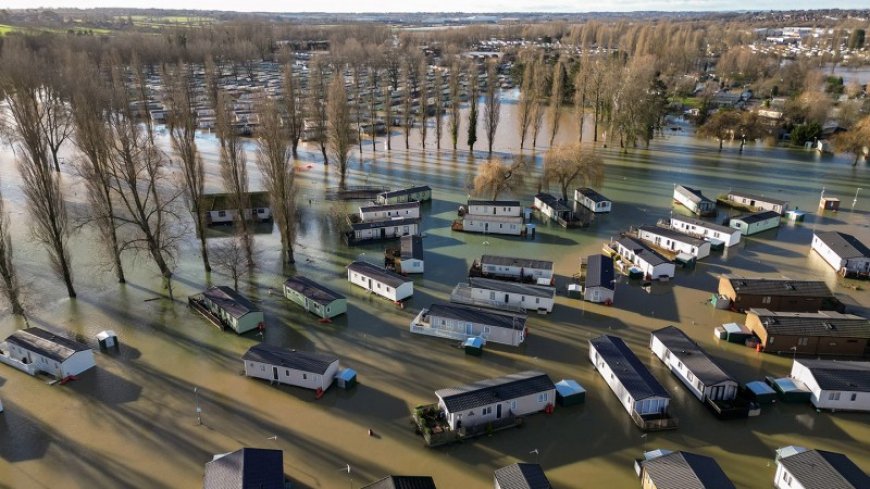The world has water problems. This book has solutions
The Last Drop tackles global water problems and explores how humans can better manage the precious resource.


The Final Drop
Tim Smedley
Picador, $29.99
A journalist and a farmer go to three fields with unusual kinds of cultivation — everyday, natural and natural and no-until — to bury cotton lingerie in every. Even regardless of the fact that this appears like the availability of a bad shaggy dog story, it’s wholly a take a take into account out of soil fitness. Healthful soil that produces sturdy plants holds masses of water and teems with existence to be able to feast on the lingerie. This scene is fully one of many in U.Okay.-based journalist Tim Smedley’s e e-book The Final Drop.
The e e-book affords an exhaustively pointed out primer on the sphere’s water matters and dives into potential fixes, consisting of agricultural remedies, security changes, tech enhancements and at-home remedies like rainwater harvesting.
“The enviornment isn’t going for walks out of water — humans are,” Smedley writes. He travels to the Hoover Dam within the American Southwest to peer the low water phases at Lake Mead (SN: 5/18/23). He visits the Core East, stopping by technique to Jordan’s Karameh Dam, the trouble the impounded water has change into too saline for irrigation. Nearer to home, he excursions Europe’s largest synthetic lake, northern England’s Kielder Water, which used to be constructed for the dimension of the late Seventies in anticipation of a water demand that petered out within about a decade of completion. It’s the southern half of of the nation that has change into water-confused.
Such megaprojects highlight how “water crises are broadly thus of the all-too-human mismanagement, now not climate,” Smedley writes. But climate commerce is truely making matters worse, he adds: “As climate commerce bites, precipitation patterns commerce.” As an celebration, the hotter surroundings holds more water vapor, a greenhouse gasoline that exacerbates warming and fuels big storms that unleash devastating floods.
Flooding might make water toxins worse. Runoff from storms consists of more nitrogen and phosphorus from farms. A “poonami” of farm animals-sourced manure, which consists of these procedure, contaminates freshwater gives, as do fertilizers (SN: 9/14/21). Some agrochemicals, Smedley writes, had been tied to raises in pediatric cancer occasions.
Transformations to farming practices, simply most of the remedies Smedley explores, may hope to mitigate toxins, water scarcity and doubtless flooding all instantly. No-until agriculture penalties in root constructions, webs of fungi and burrowing bugs that do something about a spongy soil that sucks up water. On account that they do something about more water, these fields can better climate dry spells. Their soil shape helps them face up to erosion, minimizing runoff (SN: 4/12/22). Additionally they need a prolonged technique less fertilizer this is the reason of fungi and other microbes, alongside with cowl plants planted between rising seasons, do something about and return nutritional vitamins to the soil. England’s water woes — shortages are a hardship regardless of the attention for heavy rainfall — may right be solved by technique to no-until farming by myself, Smedley’s reporting exhibits.
As for the interred lingerie, after a pair months, Smedley and the farmer unearthed dusty, holey pants from the natural and natural part, whereas the everyday farm produced dirty-but-wearable ones. The no-until part, unplowed for a couple of years, became up a “bedraggled mess” of soil, fungal residue and purple patches, alongside with a millipede that leaped from the scraps and scurried away.
Smedley packs his e e-book with on tournament funny, in many occasions serious insights that humans can apply to their lives. Most of the “water footprint” of humans within the Western world, as an celebration, comes now not from tap water used for bathing, cooking and cleaning, but from the water that goes into making the products we consume. Depending on the trouble and the way it’s grown, and the specifics of the calculations, tossing a browned avocado can waste 273 liters of water. A single steak can rate 2,000 liters. “Should you’re sporting a T-shirt crafted from cotton grown in Egypt,” Smedley writes, “that you ought to be, in a sense, sporting water from Egypt.”
Given your entire water we waste, Smedley notes, small changes might make a sleek change. “The ‘closing drop’ doesn’t propose expecting the water to run out,” he explains. “It way valuing every closing drop as treasured.”
Purchase The Final Drop from Ebook place.org. Science News is a Ebook place.org affiliate and can earn a rate on purchases crafted from links on this text.
What's Your Reaction?



























































